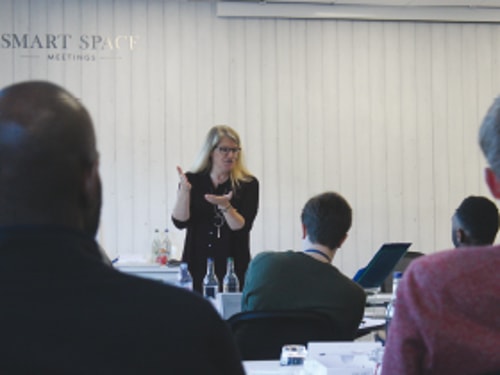When the will of those who govern the UK moves away from the will of God, evangelical Christians often come up against challenges. In the face of these tests, let's remain steadfast in the truth.
Jesus Christ’s central message was that all people should have a change of heart (repent), for the kingdom of God is at hand. Given that ‘kingdom’ quite literally means the ‘king’s domain’, this would no doubt have been of concern to the ruling authorities at that time, both Roman and Jewish. Not least because, in declaring Himself as both Lord and Saviour, Jesus was announcing the start of a whole new social and political order, and the beginning of the end for theirs. Not so much a revolution, but the revolution.
Governance without God
For the following 2,000 years, as Christians have sought to receive and demonstrate this ‘now, but not yet’ kingdom of Jesus, tensions have surfaced between those who stand by the word of God and the authorities on earth who don’t. For instance, some governments, having realised the benefits, have embraced the good that comes from God, while others have violently resisted it. Some were successful (for a time) in confusing the kingdom with the church and then blending it with their own pagan power structures – think of aspects of Christendom. While others tried to copy the values and principles of the kingdom but without God in the picture, to disastrous effect – think of communism.
Dual citizenship
In many contexts, the tension is still present today. It is often expressed through the idea of citizenship as it relates to identity, allegiances, rights, and obligations. On one hand, the Bible tells us that our citizenship is in heaven (Philippians 3:20), and that we are “a chosen people, a royal priesthood, a holy nation, God’s special possession” (1 Peter 2:9). On the other hand, we are also citizens of the United Kingdom of Great Britain and Northern Ireland. We have passports to prove it, and we seek to contribute to the common good of our society, which is a prominent part of evangelicals’ history. It is also at the heart of advocacy work at the Evangelical Alliance.
Ordinarily, the two kingdoms are able to coexist and we do what’s right by both, with Romans 13 giving us guidance for being good citizens: paying taxes, obeying the law and respecting the authorities, etc. However, problems sometimes arise because, although God (His nature, His word and His holiness) is unchanging, human ideas of citizenship are not. So, as fashions, trends and appetites change, the dominant set of ideals and beliefs of a particular time is exalted above the will of God.
It was St Augustine who famously explored this problem in his fifth-century book The City of God Against the Pagans. Written as a response to accusations that Christianity brought about the decline of Rome, the book poses questions that are relevant today, such as: What happens when these two kingdoms begin to separate sharply or even collide? How do we as followers of King Jesus respond? What do we say? How do we live?
Much change in the UK
Today in the UK, especially following moves such as the redefinition of marriage, the relationship between the state and historical, mainstream Christianity has become increasingly taut. Despite an enduring public respect for the historical contribution of the Christian faith to society and culture, as our ruling elites have become ever more secular, we have seen a growing hostility towards Christians who hold fast to the word of God.
Consider what recently happened to former Liberal Democrat leader Tim Farron. Politically this is introducing a contradiction: while there’s a general appreciation for the good works of Christians in society – from foodbanks, to street pastors, to youth work, to healthcare, and much more – there’s also a growing disdain for our words.
The local and national authorities tend to like what we do, but it’s becoming more apparent that some don’t like aspects of our beliefs. At the Evangelical Alliance we are dealing with a range of challenges to religious freedom and identity across politics and government, amid attempts to recast ‘British values’, to introduce a new set of norms.
Proposals to change sex education and to redefine gender threaten to undermine parental authority, while moves to extend ‘hate speech’ laws and rethink what counts as ‘harmful’ or ‘extremist’ threaten fundamental freedoms. As Archbishop Michael Neary of Ireland recently observed, there is now a “huge temptation to assimilate, to accept and conform to the dominant values which are at variance so often with our faith”.
A hopeful response
Our response to these challenges needs to be hopeful and imaginative. That’s why alongside being a voice for the church through our public policy work, the Evangelical Alliance’s advocacy work seeks to encourage the voice of the church by cultivating public leadership. It’s why we produced our What Kind of Society? resource – to help Christians to cast a better vision, to describe the coming kingdom of Jesus. Let’s certainly not forget that the Bible tells us to pray for our leaders (1 Timothy 2:1 – 2). Why? So that we may live a quiet and peaceable life in all godliness and all wisdom. When there is peace we can more effectively proclaim the gospel – extend the kingdom of God – so that His will for everyone to be saved comes to pass.
Steadfast in the truth
These issues may make us feel uncomfortable, but we shouldn’t be surprised. It’s not new for followers of Jesus to experience such pressures and paradox. Indeed, unwelcome as it is, it may even be a sign of the health and vitality of the church in these days — an indication that we are faithfully witnessing to both the truth and grace of Jesus in our society. So, as “we are receiving a kingdom that cannot be shaken” (Hebrews 12:28), let’s remember that to “not conform to the pattern of this world” (Romans 12:2) is itself a witness to a coming kingdom and a coming King.

What kind of society?
We paint a vision for the society we want to be.



